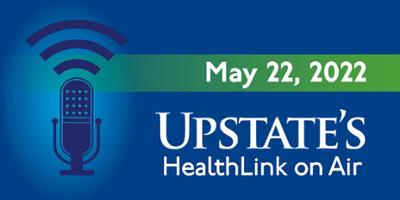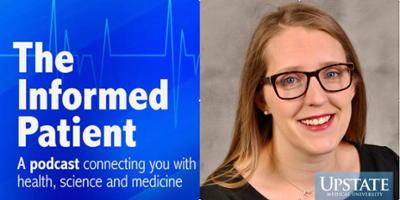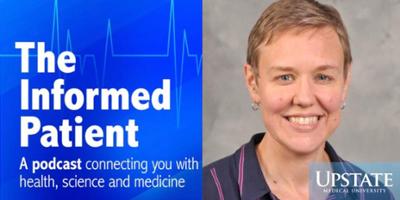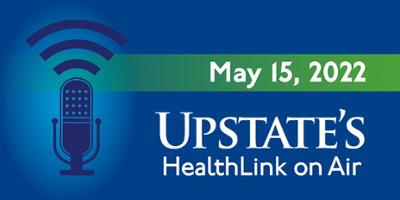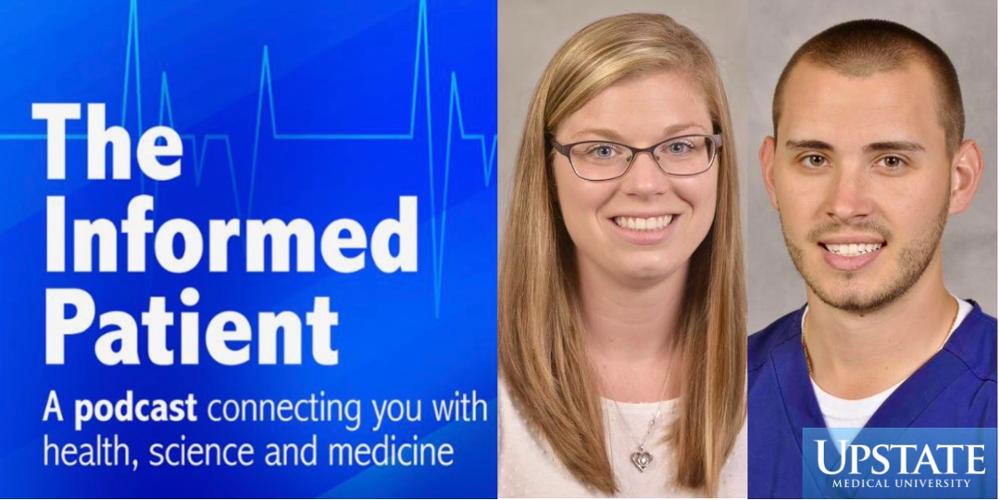
How physical therapy helps someone with cystic fibrosis
Transcript
Host Amber Smith: Upstate Medical University in Syracuse, New York invites you to be The Informed Patient with the podcast that features experts from Central New York's only academic medical center. I'm your host, Amber Smith. Cystic fibrosis is an inherited disorder that can cause severe damage to the lungs and the digestive system and other organs in the body. Today, I'm talking about resources that can be of help to people with this disease. My guests are doctors of physical therapy, Connor Delaney and Zachary Boswell, and we're going to start with a little bit of background about cystic fibrosis. Is this a disease that people are born with?
Dr. Delaney?
Connor Delaney, DPT: Yes. So this is a disease that is inherited by both of their parents. Typically both the parents do carry a specific gene. They do not have cystic fibrosis. They just carry it, and typically it's unknown if they have that gene or not. But when both parents do have the gene, it can be carried over to the child. And they typically have a one-in-four chance that the child would NOT carry the gene and not have cystic fibrosis, but there is a chance that with both parents being a carrier, that they will have cystic fibrosis.
Host Amber Smith: What problems does cystic fibrosis create in the body?
Connor Delaney, DPT: It typically affects the lungs, and it can also affect the digestive system, where with the thick mucus it can cause the ducts to get plugged, and it will interrupt the ability for them to breathe, be able to digest their food well. That's the most common. It can also affect them to have increased sweat and also to have very salty sweat, which can cause other issues in the body as well.
Host Amber Smith: Are there medications, or is there any cure for this?
Zachary Boswell, DPT: So right now, the current treatment plan involves medications that help control the symptoms, that might fight any infections from the bacteria or viruses that are around us, maybe some steroids to help with inflammation or to help the breathing become a little bit easier, opening up the airways. There are some medications that are talked about that aren't necessarily approved yet by our FDA (Food and Drug Administration) that specifically would work on that same gene that Dr. Delaney was speaking about that could directly have an impact on the symptoms that we see, but that is not readily available, as of yet.
Host Amber Smith: So mostly, if I understand you correctly, Dr. Boswell, mostly the treatments are targeting the symptoms.
Zachary Boswell, DPT: Yes. Thinning that mucus that gets thickened because of the disease process, as well as the inflammation that's caused by that process. And besides the medications, addressing the other impairments that we see, like where the nutrition or with the physical stuff that is secondary to that initial process.
Host Amber Smith: Has the expected lifespan grown for someone with CF during your career as a physical therapist?
Zachary Boswell, DPT: The lifespan has increased significantly, with increased knowledge of what is happening, how to screen and diagnose, particularly any child who's born in the United States is screened for this gene as part of standard care, so it's identified sooner than previously. And treatment has improved, with medications as well as incorporating multiple people in that care from your lung doctor to the nurses, the nutritionists, the pharmacist for the medications, your physical therapists, respiratory therapists, social worker. We are seeing that have a positive impact on the lifespan.
Host Amber Smith: Well, let's talk about the role of the physical therapist in caring for people with cystic fibrosis. Do primary care providers typically connect their patients who have CF with a physical therapist?
Connor Delaney, DPT: Typically if a cystic fibrosis patient was seeking physical therapy for help for managing their symptoms, they will be referred by their primary care physicians. As for physical therapy with the cystic fibrosis, we do have a lot to offer them that comes along with helping them clear those secretions that are thickened in a couple of different ways. We can do it manually by giving them cupping therapy or percussion therapy to their chest, into their lungs. We also give them -- they can have a device that's called the Flutter and that will help them with positive expiratory pressure, and that's basically just to help elicit a cough, for them to be able to cough up the mucus that is thickened or to help strengthen their muscles, their breathing muscles. We also can help facilitate them to exercise properly and dose their exercise prescriptions of how much they should do, what the intensity should be, and how many days a week they should do it. We can also help with breathing properly, good diaphragmatic breathing, to not use so much of their chest muscles and more of their belly muscles.
Host Amber Smith: Let me ask you a little bit about your patients. What is the youngest patient that you care for that has cystic fibrosis?
Zachary Boswell, DPT: We see patients across their whole lifespan, so as young as newborns to the adolescent or the adult patient who is coming to the clinic or is admitted in the hospital either for maybe a flare up of the CF that they've been living with, or some other medical condition that warrants coming to the hospital. So it really is a broad range, typically younger, but a broad range of ages.
Host Amber Smith: So once you have a young patient who's coming to see you, that person may stay with you for years?
Zachary Boswell, DPT: Absolutely. And that's one of the reasons why when it comes to working with people who have been diagnosed with cystic fibrosis, we have particularly at Upstate a few therapists who more so specialize with working with people in that population. Because it is such specific care, and to be able to have that professional relationship, it just improves the overall care of that patient.
Host Amber Smith: This is Upstate's "The Informed Patient" podcast. I'm your host, Amber Smith. And I'm talking with a pair of doctors of physical therapy, Dr. Connor Delaney and Dr. Zachary Boswell, about resources that can help people with cystic fibrosis.
Now, Dr. Delaney, you were talking about airway clearing, and you mentioned some things I wanted to understand better. Cupping therapy and percussion, can you explain what those are?
Connor Delaney, DPT: Yes. So what it is is typically we use our hands, and we just put them in kind of like a cupped position, and we repeat the movement on the patient's body, to help move around and decrease the thickness of the mucus in their chest, in their lungs, to help them cough it up better. So it's typically done in different positions as well. In order to get a specific lobe of the lung, the lower lobe or the upper lobe, and that helps them just get better clearance.
Host Amber Smith: And what is pulmonary rehabilitation?
Connor Delaney, DPT: Pulmonary rehabilitation is a type of physical therapy where the patient will come and we monitor their vital signs, their heart rate, and their oxygen to be able to give them a moderate intensity exercise, which is where research shows is the most beneficial to the patient to see improvements.
Host Amber Smith: I was going to ask, is there a particular way of breathing? Do you coach people with cystic fibrosis to breathe a certain way that's helpful?
Zachary Boswell, DPT: Yes. And Dr. Delaney mentioned a word earlier, the diaphragmatic breathing, so we can use a lot of different muscles to breathe. Some are more efficient or use less energy than others. So our diaphragm is our main breathing muscle that when it contracts, it helps pull our lungs open more effectively than others, such as muscles in our neck or in our chest, where are useful. If you're exercising or breathing fast or hard if you need to. However, they use lot of energy, and they don't move air as effectively. So we encourage patients to use that diaphragm. And ways we can check on that is if you're breathing and you notice your belly going up and down, that means you're more than likely using your diaphragm. If our shoulders are going up or down, then we are more than likely compensating with other muscles. And that's just not as efficient or ideal.
So using those cues to feedback or having the patient place their hands on their belly, encouraging a controlled breath in and a nice breath out, nose out through the mouth. That is one of the main ways that we can instruct and improve our breathing techniques.
Host Amber Smith: Does that make exercise difficult for someone with cystic fibrosis?
Zachary Boswell, DPT: Absolutely. Our heart and our lungs work very closely together. The heart needs oxygen, and our lungs need the blood flow in order to carry that oxygen. So if our breathing, that one part of that system isn't working as effectively or efficiently, it's going to make any exertion more challenging. We may experience fatigue or getting tired sooner than others. Our heart rate might go higher. Our oxygen numbers may suffer a little bit or a respiratory rate, how fast we're breathing, goes up. So that's one of the reasons why for pulmonary rehabilitation it's important to have providers who are knowledgeable in that area to monitor for those signs and symptoms to make sure we're doing enough to be beneficial, but not so much that we may be crossing that threshold of being unsafe.
Host Amber Smith: Is it true that people with cystic fibrosis are at higher risk for developing osteoporosis, where their bones become more brittle?
Zachary Boswell, DPT: It is. And that is a result of poor absorption of nutrients in our GI (gastrointestinal) tract. Our bone health is significantly affected by our intake of vitamin D, which we can create through sun exposure, but also through our nutrition, and also calcium. So another nutrient that our bone is made up of primarily. And if we aren't absorbing those nutrients effectively, our body doesn't have the necessary materials to maintain that health. And it can be to the detriment of our bone health.
Host Amber Smith: So nutrition, it sounds like, is especially important for someone with CF, to help maybe. Would that help reduce the risk of osteoporosis?
Zachary Boswell, DPT: It can. It can mitigate the risk, or it can also manage the risk. So it may not remove it completely, but with the assistance of a registered dietitian nutritionist, or that individual person, we can find strategies to provide the source on the route of nutrition that would be most appropriate in that situation.
Host Amber Smith: Are people with cystic fibrosis more prone to dehydration?
Connor Delaney, DPT: Yes, they are more prone to dehydration typically because of the increased sweat glands that it affects and that their sweat is more salty. So it does dehydrate them more than a person without a cystic fibrosis.
Host Amber Smith: So typically doctors will tell people, you know, to drink more water. Is that safe advice for someone with cystic fibrosis?
Connor Delaney, DPT: Yes. Drinking the adequate amount of water is important, which is something they would also talk to their registered dietician about. They will help them make sure that they get the appropriate amount of water, along with their nutrition plan, which will also help. If they're on the right nutrition plan, that will help them get as much water as they need as well, through certain foods as well.
Host Amber Smith: Now, are there some physical things that people can do to reduce joint and muscle pain? Dr. Boswell?
Zachary Boswell, DPT: Absolutely. One of my favorite sayings is "motion is lotion." And we know from physics that an object in motion stays in motion. Our bodies were made to move, but we want to be careful about how we're moving. So activities such as walking, some folks enjoy dancing, cycling, either on a bicycle or on a stationary bike, swimming is excellent. And then in the appropriate situation, once you've talked to your physician and been cleared to do so, some strength and resistance training is also beneficial to help with that muscle strength, increasing that bone health, and then focusing on flexibility. So things like yoga or stretching, doing those breathing activities to keep the muscles in our chest, in our lungs and our abdomen limber. All of those will contribute to a very healthy activity and a healthy lifestyle.
Host Amber Smith: Before we wrap up, let me ask what sort of resources or supports are available in Central New York for people with cystic fibrosis.
Connor Delaney, DPT: There is a chapter of the Cystic Fibrosis Foundation right here in Syracuse, New York, right in downtown. They have a website that you can reach that has their location, their address, as well as a phone number and email to email a person to get any information on how to live a life with cystic fibrosis, how-to management education, and support groups.
Host Amber Smith: Very good. So how would someone connect with a physical therapist who specializes in cystic fibrosis?
Zachary Boswell, DPT: Any new patients would require a physician referral. So if there are any questions or interest in an appointment, you can speak with your primary care provider, or if you have a pulmonologist, for example, and they can write a referral for physical therapy evaluation and treatment, and they can specify if there is a specific diagnosis such as cystic fibrosis. That way it can be reallocated to the appropriate therapist who might be able to help best. That information is available on Upstate.edu. Just search "physical therapy."
Host Amber Smith: Well, I appreciate both of you making time for this interview.
Zachary Boswell, DPT: Yes, ma'am, and thank you.
Host Amber Smith: My guests have been Dr. Zachary Boswell and Dr. Connor Delaney, both doctors of physical therapy at Upstate. "The Informed Patient" is a podcast covering health, science and medicine brought to you by Upstate Medical University in Syracuse, New York, and produced by Jim Howe. Find our archive of previous episodes at upstate.edu/informed. This is your host, Amber Smith, thanking you for listening.

